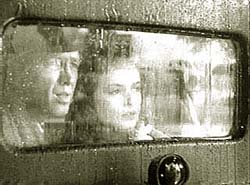Since seeing the movie, I've been snarking that Ben could have taken the social entrepreneurial approach and launched a charity foundation to help dull students with perfect academic records raise money for the top five most elite schools in the world. But all I'm saying is that it's almost impossible to care about Ben's problem.
You and me, the audience, we're more like Cole Williams (Lawrence Fishburne), especially now as the economy goes south. He's run out of options. He finally says to Ben what we're feeling throughout: You're going to figure it out. You're going to get what you want. In other words, you think you need money for Harvard Med., but what you need is an imagination, kid.
Intended to be the last second-act reversal that shoves Ben's toward desperation, that moment is the dose of reality that punctures the premise of the story. For those of us who came for entertainment, we've just watched the denouement we'd hoped for: guy gets girl, together they get the money and revenge on their mentor/professor/pimp Mickey Rosa (Kevin Spacey). They run out of the casino. They're free. Mission accomplished. Silver lining - I'm entertained! And then Cole shows up, takes the money, and tells us that suspension of disbelief was just plain stupid.
Now for the props. Congratulations on making this movie even momentarily watchable. For all the character flatness and unreality of it, the task of taking on a story about brilliant, boring, book-monkeys counting cards - COUNTING! - and making it visual story is Herculean. Because you had so little to work with in these black-jack undergrads - not falling into illegal gambling, not being corrupted by the money, not crashing and burning at school, not falling into murderous rivalries - that you succeed in making them seem occasionally sexy and funny in a PG13 movie? Bully. Bully for you.
Some ideas:
- Ben's arc: It seems that the neglected, or mangled, character arc that Ben launches is the one in which he loses his innocence. His aim is med. school - good ends - but gets money by counting cards - bad means. We don't see and aren't convinced of his struggle as he lets go of the moral sensibilities that have guided him all his life. We see little shock to his system as the new, above-the-rules sensibility takes over.
Though his two long-time friends and project partners Cam and Miles (charmingly played), stand for his past, loyalty, and getting to good ends by good means, his pain at distancing them and theirs over his defection are scarcely telegraphed. Even throughout the second act, as Ben spirals into a life of high rolling and welcome luxury, his friends do little more than complain and shrug.
To show Ben paying the price for choosing the Vegas way, suppose Cam and Miles take a more active role as observers to Ben's descent, allowing them to create consequences that matter to him emotionally - loss of friendship, being replaced on the robotics project, befriending the new guy - and challenging him throughout as the Greek chorus that reflects how bad things are getting. Or suppose Ben starts buying things for his mother, who starts sniffing around and interfering with his Vegas trips. At the very least, Mom could dog him by phone, calling him like a message from his conscience, recalling where he came from, and stabbing him with a reminder that his struggle to fund medical school has turned into a bit of a debauch. Or suppose Ben develops a profound affection for Mickey (As Goldman says, service the actors) as a substitute father figure, a relationship that's bound to be betrayed. My suspicion is that this is the shape of the script, or the first version of it, and that it became diluted in development. - Gotta Love Jill: Poor Jill. The beautiful blond cipher. There's a lot of fodder in her character to show us the contrast between Ben and her: her father taught her to play black jack, he'd bet and spend and bust. Suppose she were drawn as the amoral character who promotes the harmlessness and excitement of the scheme to Ben. As Ben is attracted to her, and she to him, their relationship would become an analog for Ben's departure from his moral sensibilities. She needn't be very "bad," but a little hard and cool, ruthless when winning is at stake, and a model of grown up behavior that Ben will try out, fall in love with, and of course, have to reject in the end. It would have placed the romance a little more squarely in the center of his motivations and provided a much stronger motivation for losing track of his med. school goal.
Gotta go. I'm playing two hands of black jack as I write. Split 'em, boss!
Screenwriters: Peter Steinfeld, Alan Loeb
[The disclaimer, a.k.a. 'Respek': All movies are hard to make, hard to write, hard to hold to the original vision when collaborating, even with the best intentions. The “movie” is the story we saw, not the story the screenwriter wrote. Every story can be better. I love a good story. I break things to see how they work. Go out and buy a ticket or purchase the DVD. Support a screenwriter. Decide for yourself.]








